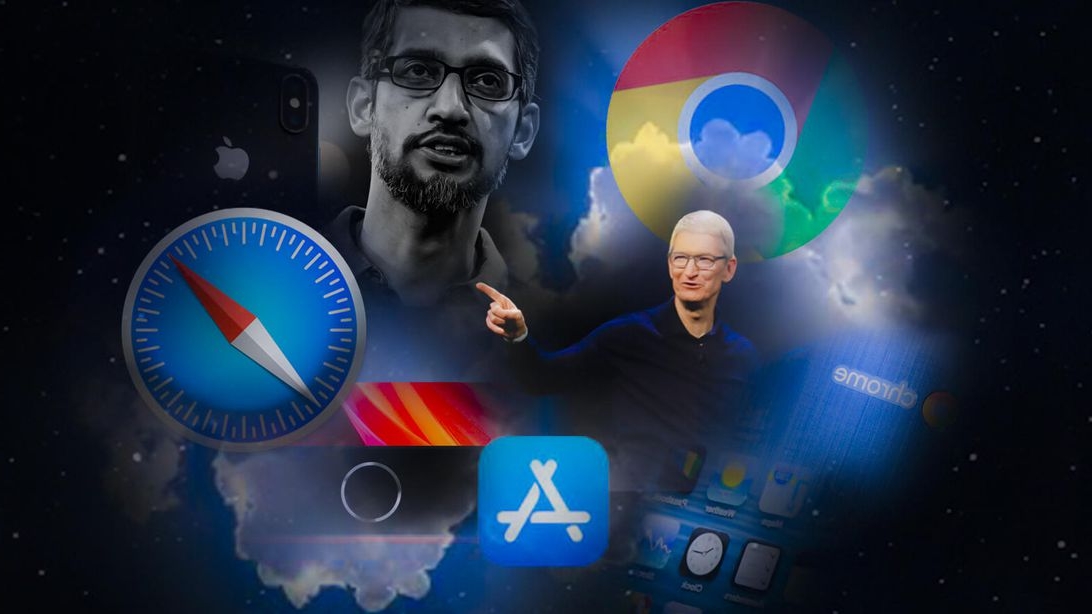chevron_left
-
play_arrow
NGradio So good... like you
share
close
Google and Apple, which already battle over mobile operating systems, are opening a new front in their fight. How that plays out may determine the future of the web.
Google was born on the web, and its business reflects its origin. The company depends on the web for search and advertising revenue. So it isn’t a surprise that Google sees the web as key to the future of software. Front and center are web apps, interactive websites with the same power as conventional apps that run natively on operating systems like Windows, Android, MacOS and iOS.
Apple has a different vision of the future, one that plays to its strengths. The company revolutionized mobile computing with its iPhone line. Its profits depend on those products and the millions of apps that run on them. Apple, unsurprisingly, appears less excited about developments, like web apps, that could cut into its earnings.
The two camps aren’t simply protecting their businesses. Google and Apple have philosophical differences, too. Google, working to pack its dominant Chrome browser with web programming abilities, sees the web as an open place of shared standards. Apple, whose Safari browser lacks some of those abilities, believes its restraint will keep the web healthy. It wants a web that isn’t plagued by security risks, privacy invasion and annoyances like unwanted notifications and permission pop-ups.
Google leads a collection of heavy-hitting allies, including Microsoft and Intel, trying to craft new technology called progressive web apps, which look and feel like native apps but are powered by the web. PWAs work even when you have no network connection. You can launch PWAs from an icon on your phone home screen or PC start menu, and they can prod you with push notifications and synchronize data in the background for fast startup.
PWA fans include Uber, travel site Trivago and India e-commerce site Flipkart. Starbucks saw its website usage double after it rolled out a PWA.
The split over native apps and web apps is more than just a squabble between tech giants trying to convert our lives online into their profits. How it plays out will shape what kind of a digital world we live in. Choosing native apps steers us to a world where we’re locked into either iOS or Android, limited to software approved by the companies’ app stores and their rules. Web apps, on the other hand, reinforce the web’s strength as a software foundation controlled by no single company. A web app will work anywhere, making it easier to swap out a Windows laptop for an iPad.
“What you’re seeing is the tension between what is good for the user, which is to have a flexible experience, and what’s good for the platform, which is to keep you in the platform as much as possible,” said Mozilla Chief Technology Officer Eric Rescorla.
Google pushes web apps
Google, the champion of web apps, leads a project called Fugu that aims to expand browser abilities. Fugu’s goal: “Web apps should be able to do anything native apps can.”
Google has power to turn its plans into reality. Its Chrome browser accounts for 65% of web usage, according to analytics firm StatCounter. That dominance is cemented by the fact that it’s the default browser on billions of phones running Android, Google’s mobile operating system. Chrome’s open-source foundation, Chromium, spreads Google PWA technology to a host of other browsers, including Microsoft Edge, Samsung Internet and Brave that also use Chromium. And when Google websites employ Google’s preferred web technology — YouTube using VP9, video compression technology or Google Docs using a key PWA storage technology called Service Workers, for example — that’s a strong incentive for other browsers to follow suit. Safari now offers Service Workers, but the feature arrived later and is missing some abilities.
Source: cnet.com
Written by: New Generation Radio
Rate it
Similar posts
ΔΗΜΟΦΙΛΗ ΑΡΘΡΑ
COPYRIGHT 2020. NGRADIO





















Post comments (0)